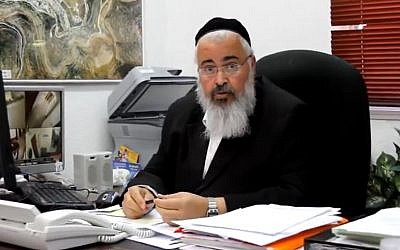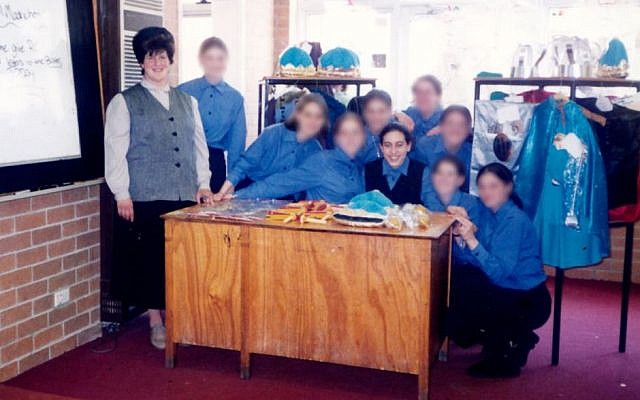EMMANUEL, West Bank — The last time the Sapper sisters saw Yisroel Aron Leifer, they had been responsible for taking him to school in Melbourne, Australia.
Over ten years had passed and the ladies were now confronting him under starkly different circumstances.
The young boy was now a teen living in Israel, where his family had fled amid accusations that his mother Malka Leifer molested students — among them sisters Nicole, Dassi and Elly — at the Adass Israel ultra-Orthodox girls’ school where she served as headmaster.
The Sappers say Leifer offered to privately tutor vulnerable students aged 14-15 and would exploit the private time in her office and at her home to abuse the young girls.
Leifer, an Israeli citizen, booked a red-eye flight with her family to Tel Aviv in 2008, following a heads-up from Adass officials days before the allegations against her surfaced.
Last February, the 51-year-old mother of eight was arrested by authorities who seek to extradite her back to Australia where she faces 74 charges of child sexual abuse.
Nicole (33), Dassi (31) and Elly (29) were in Israel last week to attend the 42nd court date connected to Leifer’s extradition — a process that has faced repeated delay due to appeals by her defense team, who have argued that she is mentally unfit to stand trial.
The sisters used their time in Israel to retrace the steps of their former principal, who after spending several years in the ultra-Orthodox town of Bnei Brak, had moved to the Emmanuel settlement.
That was what brought them to the remote Haredi community tucked away in the northern West Bank hills.
Recalling the experience in a Thursday interview with The Times of Israel at their Jerusalem Airbnb apartment, the sisters said the trip to Emmanuel helped them understand why Leifer had been able to evade imprisonment for nearly a decade
Upon arriving at the settlement several days prior, the three women headed straight to the four-story apartment building where Leifer had lived. Coincidentally, Yisroel Aron was just arriving at the complex as well.
They tried speaking with him, but the young man did not say a word. He simply walked up to his apartment on the top floor, retrieved a smartphone and began taking what the sisters said must have been hundreds of photos of them.
Realizing that he was not interested in speaking, the women began knocking on the doors of neighbors in hopes of gathering more information on their alleged abuser.
“One after the other, the people in her building told us that they had just moved in and did not know her,” Dassi related, saying that they believed the neighbors had been coached to respond in this way.
Outside the Leifer apartment, the sisters noticed that there was a a sign on the door identifying the family inside.
“You’d think they would’ve taken that down,” said Dassi. “It showed that they had no issue letting community members know who they were.”
When the sisters exited the building in Emmanuel, they said there were maybe ten residents out on their balconies joining Leifer’s son in photographing them.
“They were so protective of her. Nobody there was willing to talk to us even though they know what she’s been accused of,” said Elly.
“Now I know how she could have lived there for so long — because they don’t believe in the police or the court system there, which one of [the neighbors] characterized to us as goyim (non-Jews).”
Distinguishing Emmanuel from the similarly ultra-Orthodox Bnei Brak where Leifer had first lived upon arriving in Israel, Nicole said the town’s isolated nature made it feel like “you’re walking into another little country with its own justice system.”
“What justice system that is, I couldn’t tell you,” she added, positing that Leifer chose the northern West Bank settlement to get as far “off the map” as possible.
Leifer lived in Emmanuel for roughly three years before she was arrested in 2014 after Australian authorities officially submitted a request for extradition. However, she was subsequently released to house arrest, with her attorney arguing that she was too mentally ill to stand trial.
In 2016, the Jerusalem District Court froze the extradition process entirely, accepting the conclusions of a state psychiatrist who found Leifer to be catatonic. All restrictions on the former principal were subsequently lifted.
But in February 2018, Leifer was rearrested on obstruction of justice charges after private investigators filmed her going about her normal routine without any apparent difficulty.
City of refuge
The Times of Israel made several trips to Emmanuel over recent months to determine the degree to which residents were aware of Leifer’s past.
Established in 1983, the town of roughly 3,500 is among the poorest in Israel. Dozens of buildings have remained under construction for years due to lack of funds, the few green, open areas that exist are littered with trash, and shelves in the settlement’s lone supermarket are stocked with items whose expiration dates have long passed.
Emmanuel gained notoriety over a decade ago when the High Court of Justice ordered a Bais Yaakov girls’ school in the town to cease its policy of separation between Ashkenazi and Sephardi students. Among the leaders of the campaign against the academy’s segregation was Ezra Gershi, who went on to be elected mayor in 2008 and again in 2013.

Emmanuel mayor Ezra Gershi in his office on December 11, 2011. (Screen capture/YouTube)
But his reputation has since been tainted by allegations of corruption, and he was indicted last August for election fraud. Among the charges against him over his conduct in the 2013 municipal elections, was an accusation that he allowed Chabad leaders in the town to convert a brand-new, publicly funded gymnasium into a private yeshiva in exchange for hundreds of votes from Chabad-affiliated residents.
Despite the indictment against him, Gershi submitted his candidacy for a third term and was said to have had a good chance of winning. However, days before the election, he dropped out of the race and threw his support behind Eliyahu Gafni, who agreed to make Gershi his deputy after securing a landslide victory on October 30.
Speaking to The Times of Israel prior to the filing of charges against him, Gershi said he had learned about the accusations against Leifer “in the news,” after she had already moved to the community. However, he refused to pass judgment on the woman, saying she came from “a respected family.”
The ex-mayor’s view on Leifer appeared par for the course in Emmanuel, where most of the roughly two dozen people who spoke with The Times of Israel were only vaguely familiar with the accusations against the former principal and not particularly disturbed by them, either.
One of Leifer’s neighbors, Chaya Brand, said she “never believed the information some people were sharing from the internet.”
She also reasoned that given “how successful [Leifer’s] children have been, there is no way they came from a home with a mother who committed such crimes.”
One teenage resident said Leifer was “kindhearted” and would frequently invite her over for meals. The girl was unaware of the accusations against Leifer and of the fact that she was currently in prison.
A man who asked to be identified only as Reuven said he was not surprised when he learned that a woman with such allegations against her would move to Emmanuel.
“This is a city of refuge. Anyone in the Haredi world who has gotten himself into trouble winds up moving here,” he said, dropping his finished can of Coke onto the street. “Someone who needs the money will come and collect that,” he explained, unwittingly demonstrating the level of poverty in the town.
In July, the Sydney Morning Herald reported that a convicted child molester named Yehiel Shinin had moved to Emmanuel shortly after being released from prison, telling residents that he wanted “to start a new life.” However, he was rearrested shortly afterwards amid accusations that he sexually abused a 12-year-old resident of the town.
The expose also featured the testimony of a resident named Daniel, who told the Herald that Leifer had tried to molest his daughter after offering to privately tutor her.
An Emmanuel municipal official told The Times of Israel that Leifer had been allowed to teach for a brief period at one of the schools in the settlement, even though community leaders had been made aware of the accusations against her.
“The rabbis didn’t allow her to have her own class. She was more of an assistant,” the official said, clarifying that community leaders were not acting maliciously, but rather out of ignorance.

After less than a year, the chief rabbi of Emmanuel, Yitzhak Meir Barlev, ordered that she be removed from the school entirely.
Barlev confirmed having given the directive but said it was a mere precaution. “The family did not cause a single problem since moving to the community,” he asserted.
The Times of Israel reached out to several members of the Leifer family for comment, but each declined to provide any.
Giving up is not an option
The Sapper sisters said they were very disturbed but not surprised to hear that similar accusations had been made against Leifer since she arrived in Israel.
Dassi said the news meant that more “blood was on the hands” of those members of the Adass Israel board who allowed Leifer to flee.

Adass Israel ultra-Orthodox girls school headmistress Malka Leifer (left) with her students, among them Nicole Meyer (center) in 2003. (Courtesy)
“Those people are culpable for every subsequent abuse that’s taken place,” she declared.
In April 2016, Dassi won a civil suit against the school in Victoria’s Supreme Court in Melbourne and was awarded AU$1.27 million in damages.
A year later, she began publicly campaigning for Leifer’s extradition. As part of that effort, Dassi and her sisters met with Israeli lawmakers from nearly every political party last week in order to garner support for their cause.
The only two factions whose members refused to meet with them were the ultra-Orthodox parties — United Torah Judaism and Shas. The sisters were hoping to sit down with UTJ chair Yaakov Litzman, whose role as deputy health minister is relevant to their case.
However, upon identifying themselves after bumping into him in the Knesset, the sisters said that Litzman immediately told them he was not interested in getting involved in the matter.
“I don’t want to speak to you. I don’t want to have anything to do with this,” the women quoted him as angrily saying.
They said that the deputy health minister emphatically told them that while he would not support Leifer’s extradition, he also would not interfere if the court ruled she be sent back to Australia.
While the Sappers said they left the rounds of meetings with Knesset members feeling increasingly heard, they endured a “gut punch” last week when Leifer’s attorney successfully argued that the former principal would not have to appear in court for the latest extradition-related hearing, which would also be held behind closed doors.
The two-pronged decision dashed the sisters’ plans to publicly face their alleged abuser in court for the first time.
“They’ve made this whole case about mental illness, rather than her crimes,” Nicole lamented.
Nonetheless, the sisters maintained that they still have faith in the Israeli justice system, despite the extradition process that has dragged on since 2014.
“If we didn’t have faith (in the system), that would mean us giving up, and we’re not willing to give up,” said Dassi. “We’re hoping that this case will become an example that will scare every abuser who thinks they can hurt someone and get away with it.”

No comments:
Post a Comment